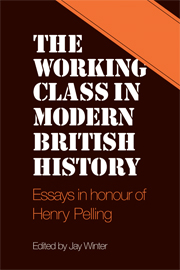Book contents
- Frontmatter
- Contents
- Introduction: labour history and labour historians
- I The working class in British politics
- 1 The social democratic theory of the class struggle
- 2 Keir Hardie and the Labour Leader, 1893–1903
- 3 Winston Churchill and the working class, 1900–14
- 4 Expectations born to death: local Labour party expansion in the 1920s
- 5 Post-war reconstruction in Wales, 1918 and 1945
- 6 Imperialism and the Labour government of 1945–51
- II The working class in British society
- List of the published writings of Henry Felling
- Notes
- Index
5 - Post-war reconstruction in Wales, 1918 and 1945
Published online by Cambridge University Press: 05 November 2011
- Frontmatter
- Contents
- Introduction: labour history and labour historians
- I The working class in British politics
- 1 The social democratic theory of the class struggle
- 2 Keir Hardie and the Labour Leader, 1893–1903
- 3 Winston Churchill and the working class, 1900–14
- 4 Expectations born to death: local Labour party expansion in the 1920s
- 5 Post-war reconstruction in Wales, 1918 and 1945
- 6 Imperialism and the Labour government of 1945–51
- II The working class in British society
- List of the published writings of Henry Felling
- Notes
- Index
Summary
When I was appointed to succeed Henry Pelling as Fellow and Praelector in Modern History and Politics at the Queen's College, Oxford, in 1966, my first reaction was one of some apprehension at having to follow a scholar of such eminence who had served at Queen's for the previous seventeen years. However, I was fortified by the thought that, then, as now, one of my major research interests was the history of Wales, including its labour history, in the recent period. For Dr Pelling has always been distinguished for seeing the history of the labour movement and other aspects of late nineteenth- and twentieth-century history in a British, and not merely an English, context. Indeed, in a famous review of A. J. P. Taylor's English History 1914–1945, he showed how misleading it was to examine British political developments since the First World War without relating them centrally to the Welsh and Scottish dimension. Dr Pelling has written in the Welsh History Review on more than one occasion. His Social Geography of British Elections contains excellent sections on the electoral history of both Wales and of Scotland between 1885 and 1910. His essays on Popular Politics and Society include many incidental observations on the importance of political and industrial developments in the Celtic nations, for instance on the impact of the Welsh miners upon the outlook of the Miners' Federation of Great Britain between 1906 and 1910.
- Type
- Chapter
- Information
- The Working Class in Modern British HistoryEssays in Honour of Henry Pelling, pp. 82 - 98Publisher: Cambridge University PressPrint publication year: 1983



